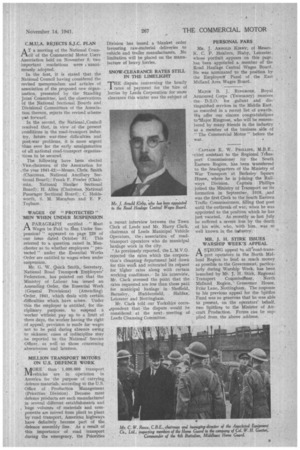C.M.U.A. REJECTS S.J.C. PLAN
Page 19

If you've noticed an error in this article please click here to report it so we can fix it.
AT a meeting of the National Council of the Commercial Motor Users
Association held on November 5, two important resolutions were unanimously adopted.
In the first, it is stated that the National Council having considered the revised memorandum and articles of association of the proposed new organization, presented by the Standing joint' Committee, and, the observations of the Igational Sectional Boards and Divisional Committees of the Association thereon, rejects the revised scheme pat forward. In the second, the National.Council resolved that, in view of the present conditions in the 'road-transport industry, future war-time difficulties and post-war problems, it ri more urgent than ever for the early amalgamation of all national road-transport organizations to be secured.
The following have been 'elected Vice-chairmen of the Association for .the year 1941-42:--Messrs. Chris. Smith (Chairman, National Ancillary Sectional Board); Frank F. Fowler (Chairman, National Haulier Sectional Board); H. Allen (Chairman, National Passenger Sectional Board); C. Holdsworth, S. M. Macadam and E. F. Topham.
WAGS ' OF " PROTECTED " MEN WHEN UNDER SUSPENSION A PARAGRAPH entitled " Must Wages be Paid to Alen Under Suspension? " appeared on page 228 of • our issue dated October 31. This referred to a question raised in. Manchester as to whether employees " protected " under the Essential Works Order are entitled to wages when under suspension.
Mr. G. W. Quick Smith, Secretary, National Road Transpore Employers' Federation, has pointed out that the Ministry of Labour has issued an Amending Order, the Essential Work (General Provisions) (Amending) 'Order, 1941, which deals with certin difficulties which have arisen. Under this the employer is entitled, for "disciplinary purposes, to suspend a worker withont pay up to a limit of three days, the worker having the right -of appeal; provision is made for wages not to be paid during absence owing to sickness; cases of indiscipline may Ape reported to the National' Service Officer, as well as those concerning absenteeism and lateness.
























































